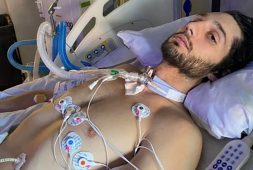
In a recent study, a research group mapped out the brain activity of healthy volunteers as they learned new skills like playing a song on an instrument. What they found was that by taking short breaks during practice actually helps when it comes to learning.
The research group, from the National Institute of Health, discovered that when the volunteers would take rests, their brains ‘rapidly and repeatedly replayed faster versions of the activity seen while they practiced typing a code.’ Moreover, as the volunteers replayed their activity, during their next practice sessions, they performed much better. What their findings implied is that it was in the rest that they strengthened their memories.
According to the study’s senior author, Dr. Leonardo G. Cohen, “Our results support the idea that wakeful rest plays just as important a role as practice in learning a new skill. It appears to be the period when our brains compress and consolidate memories of what we just practiced.”
He adds, “Understanding this role of neural replay may not only help shape how we learn new skills but also how we help patients recover skills lost after neurological injury like stroke.”
The study, which was done at the NIH Clinical Center, shows how Dr. Cohen’s team used a process called magnetoencephalography, which is a highly sensitive scanning technique which can record brain waves. The team recorded the brain waves of 33 healthy, right-handed respondents as they learned to type a five-digit code using their left hands rather than their right hands.
The study had the participants sit in a chair that was under the long, cone-shaped cap of the scanner. As they were shown the code “41234” on a screen, they had to type it out as many times as possible for a span of 10 seconds, taking a 10 second break in between cycles. They were made to repeat this cycle of alternating practice and resting 35 times in total.
In the first few trials of the participants, their speed of correctly typing in the code had dramatic improvement, eventually leveling off by the 11th cycle. In addition, a former study that was led by a member of Dr. Cohen’s team and a former NIH postdoctoral fellow, Marlene Bönstrup, they showed how these improvements happened ‘during short rests’ rather than when the subjects were actually typing the code out.
Furthermore, these gains were also better than ‘those made after a night’s sleep and were correlated with a decrease in the size of brain waves, called beta rhythms.’ For the new study, the research team chose to look for differences within the brain waves of the subjects.
According to staff scientist and leader of the study on Dr. Cohen’s team, Ethan R. Buch, “We wanted to explore the mechanisms behind memory strengthening seen during wakeful rest. Several forms of memory appear to rely on the replaying of neural activity, so we decided to test this idea out for procedural skill learning.”
In order to test this out, former postdoctoral fellow that works in Dr. Cohen’s lab, Leonardo Claudino, helped Dr. Buch create a computer program that allowed the team to figure out which brain wave activity was associated with the typing out of each number for the test code.
What the program managed to do was help them ‘discover that a much faster version – about 20 times faster – of the brain activity seen during typing was replayed during the rest periods.’ During the 11 practice trials, the researchers took the compressed versions of the activity and replayed them around 25 times per rest period.
The study, which was published in Cell Reports, explained how this was ‘two to three times more often than the activity seen during later rest periods or after the experiments had ended.’
The study authors share that what they found from the study was that it was during the frequency of reply during the rest period that furthered memory strengthening. What this meant was that the participants whose brains replayed the typing activity more had better performance results after every trial than those that replayed them less.
Dr. Buch shares, “During the early part of the learning curve we saw that wakeful rest replay was compressed in time, frequent, and a good predictor of variability in learning a new skill across individuals. This suggests that during wakeful rest the brain binds together the memories required to learn a new skill.”
The research team also explains that as expected, they found that it was in the sensorimotor regions of the brain, which is the same area answerable for controlling movements, that the replay activity happened the most. But, they also noticed activity in other regions of the brain, mostly the hippocampus and entorhinal cortex.
Dr. Buch adds, “We were a bit surprised by these last results. Traditionally, it was thought that the hippocampus and entorhinal cortex may not play such a substantive role in procedural memory.”
He continued, “In contrast, our results suggest that these regions are rapidly chattering with the sensorimotor cortex when learning these types of skills. Overall, our results support the idea that manipulating replay activity during waking rest may be a powerful tool that researchers can use to help individuals learn new skills faster and possibly facilitate rehabilitation from stroke.”



